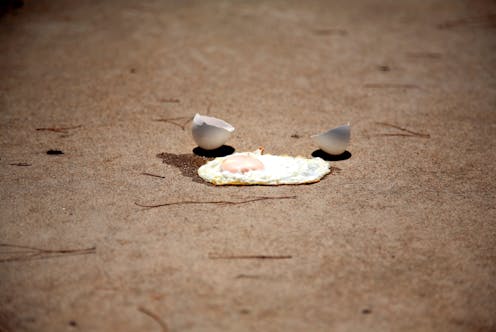can you really fry an egg on the footpath on a hot day?
- Written by Chris Thompson, Associate Dean (Education) - Science, Monash University

Aahh, the Australian summer. When the temperatures top 40℃ and only the bravest or most foolhardy would venture outside in bare feet, there’s a cherished old saying: “it’s so hot outside you could fry an egg on the footpath!”
But what does the science say? Does this claim stack up, or it half-baked?
To answer this question, we need to understand the chemicals inside an egg, what happens to them during the cooking process, and whether the footpath really gets hot enough to drive these chemical changes.
The first and most obvious point is that the egg’s yolk and white are chemically very different[1]. The white, which makes up about two-thirds of an egg’s mass, is roughly nine parts water and one part protein. The key here is that the protein’s structure changes if you heat it above a certain temperature.
About half the yolk’s mass is water, about a quarter is “fat”, about one-sixth is protein, and less than 5% is carbohydrates. The protein in the yolk is a completely different type of protein, but much like with the egg white, it’s how the protein responds to heat that gives us the texture of fried, scrambled, poached or hard-boiled eggs.
Ok, so how does this work?
We can think of proteins as being long chains of molecules called amino acids. In a raw egg, the protein is suspended in the watery mixture. The chain is curled up in a very particular way, held in shape by weak chemical bonds between different parts of the chain as it folds over on itself (the animation below shows the folded structure of ovalbumin, the main protein in egg white). This keeps it stable, and able to mix with the water.
But once it’s heated up, the heat energy starts to break these weak chemical bonds and the chain begins to uncurl, rearrange itself and stick together again in a completely different way.
Suddenly, these reconfigured clumps of protein molecules are no longer water-soluble, and so they solidify. This is why eggs get harder if you cook them for longer.
This process is called denaturation, and it can happen to any type of protein. Denaturation is what turns milk into curds and whey, and changes the texture of meat as it cooks.
Read more: Kitchen Science: the chemistry behind amazing meringue and perfect cappuccino[2]
For eggs, denaturation begins at around 60℃, but this is likely to only slightly cook the egg whites, and the yolk will not turn solid at all[3].
As you slowly go from 60℃ to 70℃, however, there is more heat energy available and all of the egg’s proteins now begin to denature. The egg white begins to turn gel-like and eventually rubbery, and the yolk begins to solidify into a viscous goo, before eventually becoming solid or even slightly powdery in texture.
Get the temperature right and this process unfolds nice and gradually, which means with a bit of practice you can get your eggs to turn out exactly how you like them.
Righto, so is a footpath hot enough for this?
That leaves us with the crucial question: how hot does pavement get on a scorching summer day? Does it reach the almost 70℃ you would need for a footpath fry-up?
This depends on a lot of factors, including the air temperature, direct sunlight, the footpath material and even its colour. Black-painted concrete, for example, absorbs more heat than white or unpainted concrete.
All in all, at the peak of these conditions, on a boiling summer day, a footpath can potentially just about reach the right temperature. But sadly, that’s still not enough to sizzle an egg.
First, concrete is a poor conductor, so it will transfer heat to the egg much more slowly than a metal frying pan. Second, after cracking the egg onto the footpath, the footpath’s temperature will drop slightly.
Read more: Why you can’t fry eggs (or testicles) with a cellphone[4]
So if you were hoping for a cheap way to cook your sunny-side-up eggs on the footpath this summer, you might be disappointed. It’s much wiser to head back indoors to the kitchen. Your egg will be hotter, and you’ll be much cooler.
References
- ^ chemically very different (www.compoundchem.com)
- ^ Kitchen Science: the chemistry behind amazing meringue and perfect cappuccino (theconversation.com)
- ^ not turn solid at all (blogs.unimelb.edu.au)
- ^ Why you can’t fry eggs (or testicles) with a cellphone (theconversation.com)
















